Digital Branding Strategies
Why Brands Are Trending in 2025: Key Insights and Reasons
Overview
In 2025, brands are experiencing a significant trend shift driven by the escalating consumer demand for authenticity and personalized experiences, fundamentally reshaping marketing strategies.
Companies must adapt to these evolving expectations by effectively leveraging social media, user-generated content, and data analytics.
This strategic approach is essential for fostering deeper connections with consumers and enhancing customer loyalty, which ultimately influences purchasing decisions.
Brand Managers must recognize the imperative of these changes and take action to align their strategies accordingly.
Introduction
In 2025, the branding landscape is undergoing a transformative shift, positioning brands as pivotal influencers in consumer decision-making. As consumers increasingly demand authenticity and personalized experiences, companies must adeptly navigate a saturated market where differentiation is not just advantageous but essential.
With an astounding 88% of customers prioritizing genuine branding efforts, organizations confront the challenge of evolving their strategies to meet these heightened expectations. This article examines the pivotal trends shaping branding in the coming years, exploring the critical roles of:
- Social media
- User-generated content
- Personalized marketing
in fostering deeper connections with consumers. As brands adapt to these dynamics, the significance of authenticity and strategic engagement becomes paramount for cultivating loyalty and driving success in an increasingly competitive environment.
Understanding the Brand Trend: An Overview for 2025
In 2025, companies are increasingly recognized as pivotal players in shaping purchasing decision-making processes. This evolution is driven by several key factors, notably a substantial rise in consumer expectations for authenticity—88% of customers now prioritize genuine branding efforts. As digital platforms proliferate, companies must differentiate themselves in an increasingly saturated market.
Consumers are becoming more discerning, gravitating towards companies that align with their values and offer personalized experiences. Notably, 43% of individuals unfollow companies that post excessive social media advertisements, underscoring the necessity for organizations to engage thoughtfully with their audience.
This shift highlights the critical importance of strategic identity in fostering customer loyalty and engagement. Companies that fail to connect with their audience risk alienation; 76% of individuals indicate that interactions with businesses falter when perceived as unwanted or intrusive. Therefore, businesses must adapt their marketing strategies to meet these evolving consumer demands, ensuring their messaging remains relevant and authentic.
Moreover, the impact of brand identity on consumer decision-making is profound. Effective branding not only enhances market position but also drives customer loyalty and revenue growth, reflecting the entity’s value and competitive advantage. As illustrated in case studies like WonderEight’s guidance on user-generated content (UGC) campaigns, companies that establish clear objectives and understand their audience can cultivate deeper connections.
The structured approach outlined by WonderEight emphasizes the importance of leveraging influencers and engaging with customers, ultimately influencing purchasing decisions. Furthermore, WonderEight’s innovative branding solutions provide companies with tailored strategies to enhance their market visibility and align with customer expectations.
In conclusion, the brands gaining traction in 2025 underscore the necessity for companies to embrace authenticity and strategic positioning to thrive in a competitive landscape, thereby reinforcing their role as essential influencers in buyer decisions.
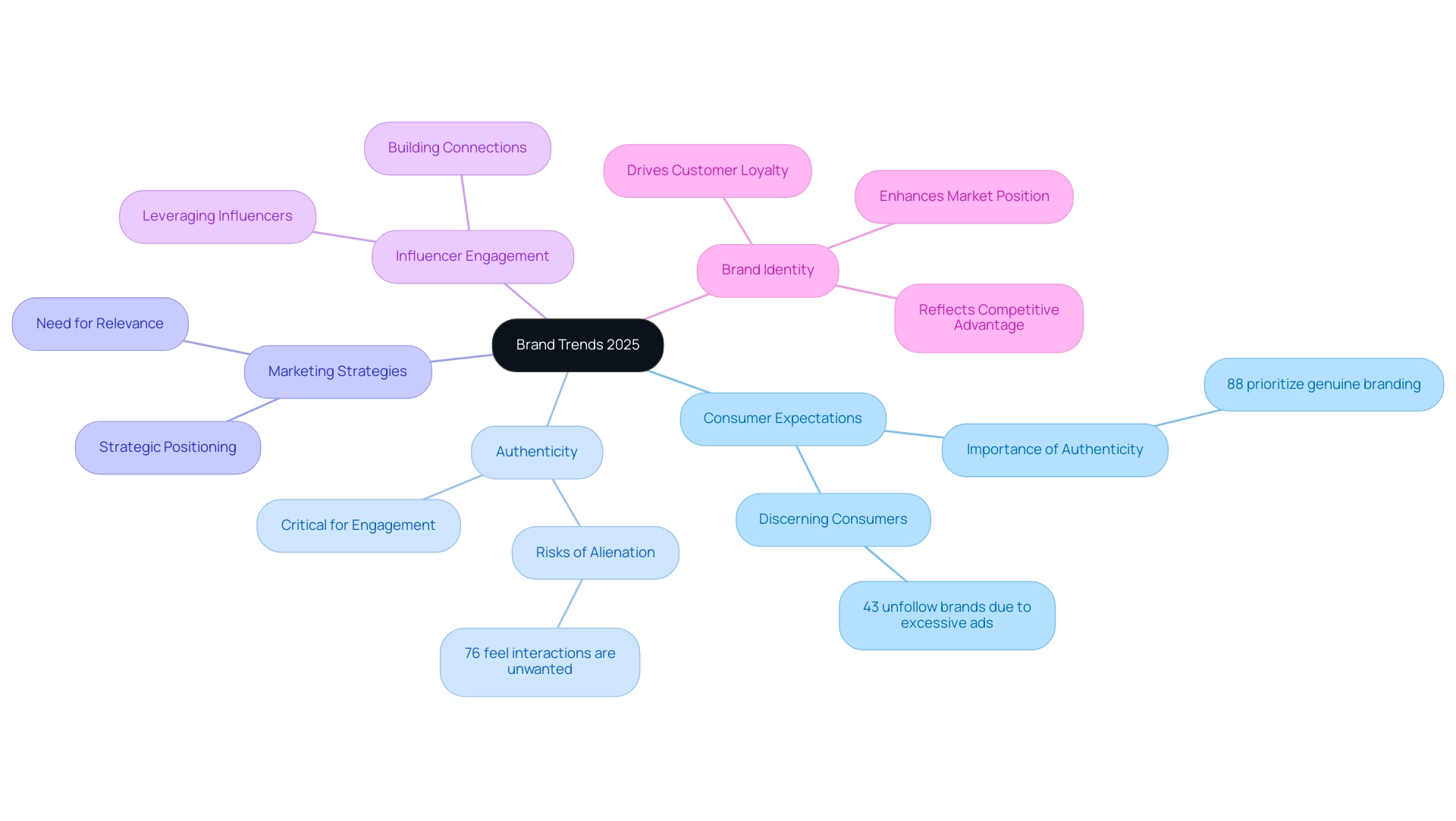
The Role of Social Media in Brand Popularity
In 2025, social media stands as a pivotal force in shaping popularity, with platforms like Instagram and TikTok at the forefront. These channels empower companies to engage directly with consumers, facilitating real-time exchanges that enrich feedback and foster community involvement. Brands trending that leverage the power of social media can craft compelling narratives that resonate profoundly with their target audiences.
The impact of visually captivating content, strategic influencer partnerships, and interactive campaigns is profound; these elements significantly boost visibility and nurture a sense of community among followers. Notably, a 26% increase in TikTok influencer campaigns in 2023 underscores the platform’s growing importance in marketing strategies. Moreover, American businesses are increasingly turning to social media for brand awareness, customer engagement, and direct sales, underscoring the critical role these platforms play in contemporary marketing.
As consumers increasingly rely on social media for product discovery, businesses must prioritize robust social media strategies to keep pace with trending brands and maintain a competitive edge.
Case studies reveal that successful companies are already harnessing these platforms to enhance engagement. For instance, companies like Castania have seen a significant uplift in brand identity through targeted social media initiatives, while Motorola’s digital campaigns have effectively captured audience attention. As Ashley Wright, a TikTok expert, asserts, “TikTok Shop is the channel you should be looking out for 2024.”
This insight emphasizes the necessity for companies to adapt to evolving trends. Furthermore, the competitive landscape of media consumption patterns indicates that companies, particularly those with trending brands, must diversify their engagement strategies across various platforms to thrive. As the landscape evolves, integrating social media into marketing approaches will be essential for enhancing consumer engagement and loyalty in the future.
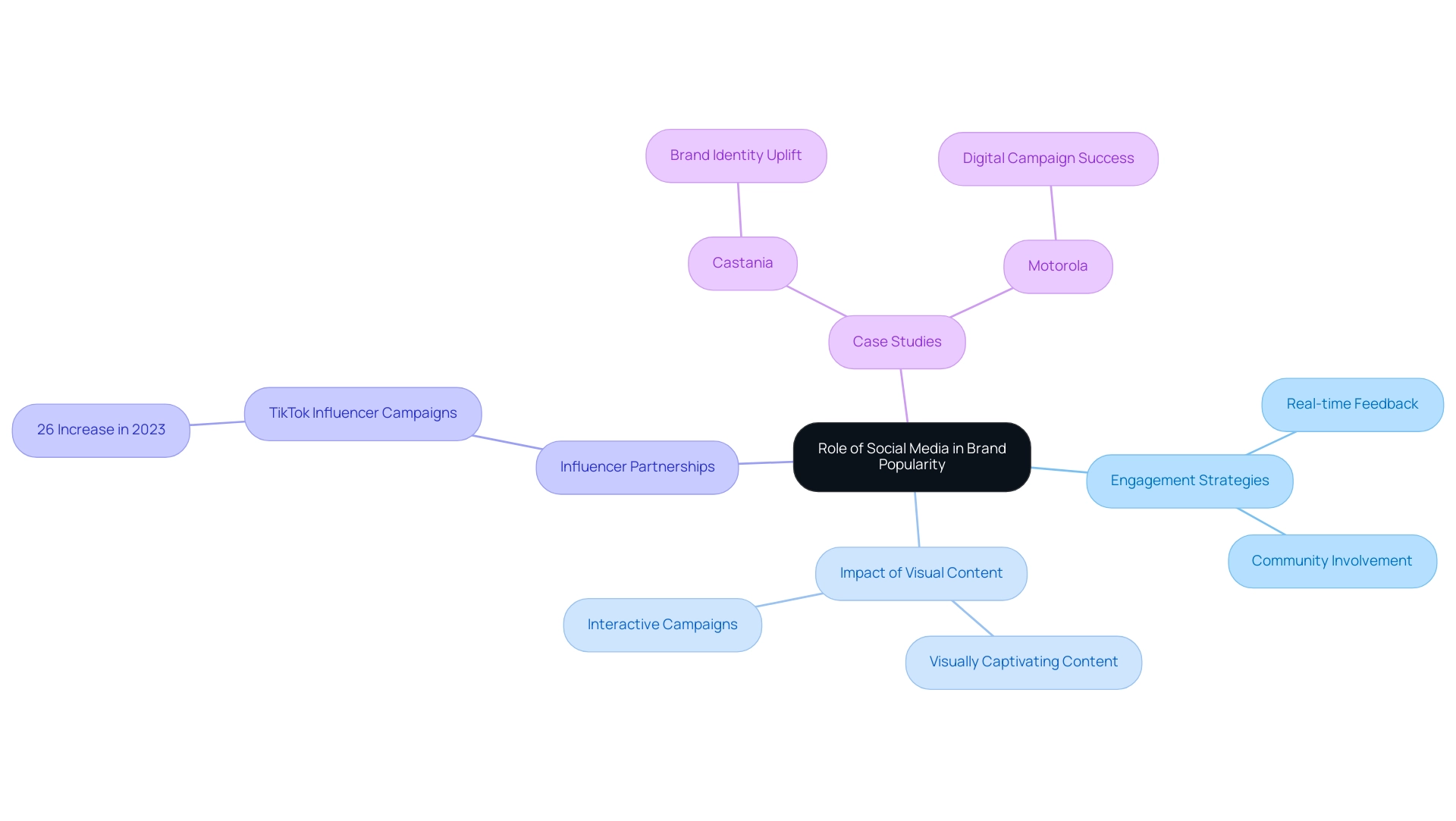
Effective Strategies for Brands: Leveraging Trends and Engagement
In the competitive landscape of 2025, companies must adopt innovative strategies that capitalize on trending brands to enhance engagement and visibility. A significant emphasis is placed on utilizing trending hashtags, which amplify messages and foster community interaction. Engaging content formats, such as short videos and Reels, are essential tools for capturing audience attention and encouraging user participation, ultimately enhancing organic reach.
Moreover, the power of interactive storytelling is harnessed to create memorable experiences. This method not only fascinates audiences but also motivates them to share their experiences, further extending the company’s reach. For instance, a comprehensive campaign for Quaker Oats by WonderEight exemplified this strategy, successfully engaging customers and leading to increased product recognition and sales growth. This showcases WonderEight’s expertise in crafting impactful marketing solutions.
Data analytics emerges as a cornerstone of effective marketing strategies in 2025. With 40% of U.S. adults reviewing online feedback prior to making purchases, understanding buyer behavior through data enables companies to customize their messaging and offerings to address specific audience needs. This insight is crucial for building trust and fostering deeper connections with customers.
Furthermore, utilizing advanced precision tools can reveal up to 240% greater ROI on campaigns, highlighting the efficacy of data-driven strategies.
As companies navigate this changing environment, they must remain aware of trending brands and emerging trends. By leveraging these insights, companies can drive engagement and achieve measurable outcomes, ensuring their strategies are visually appealing and strategically sound. Significantly, a signature color can enhance the likelihood of consumers recognizing a label by 80%, emphasizing the importance of intentional branding decisions.
WonderEight’s dedication to innovative marketing solutions establishes it as a leader in assisting companies to navigate these trends effectively.
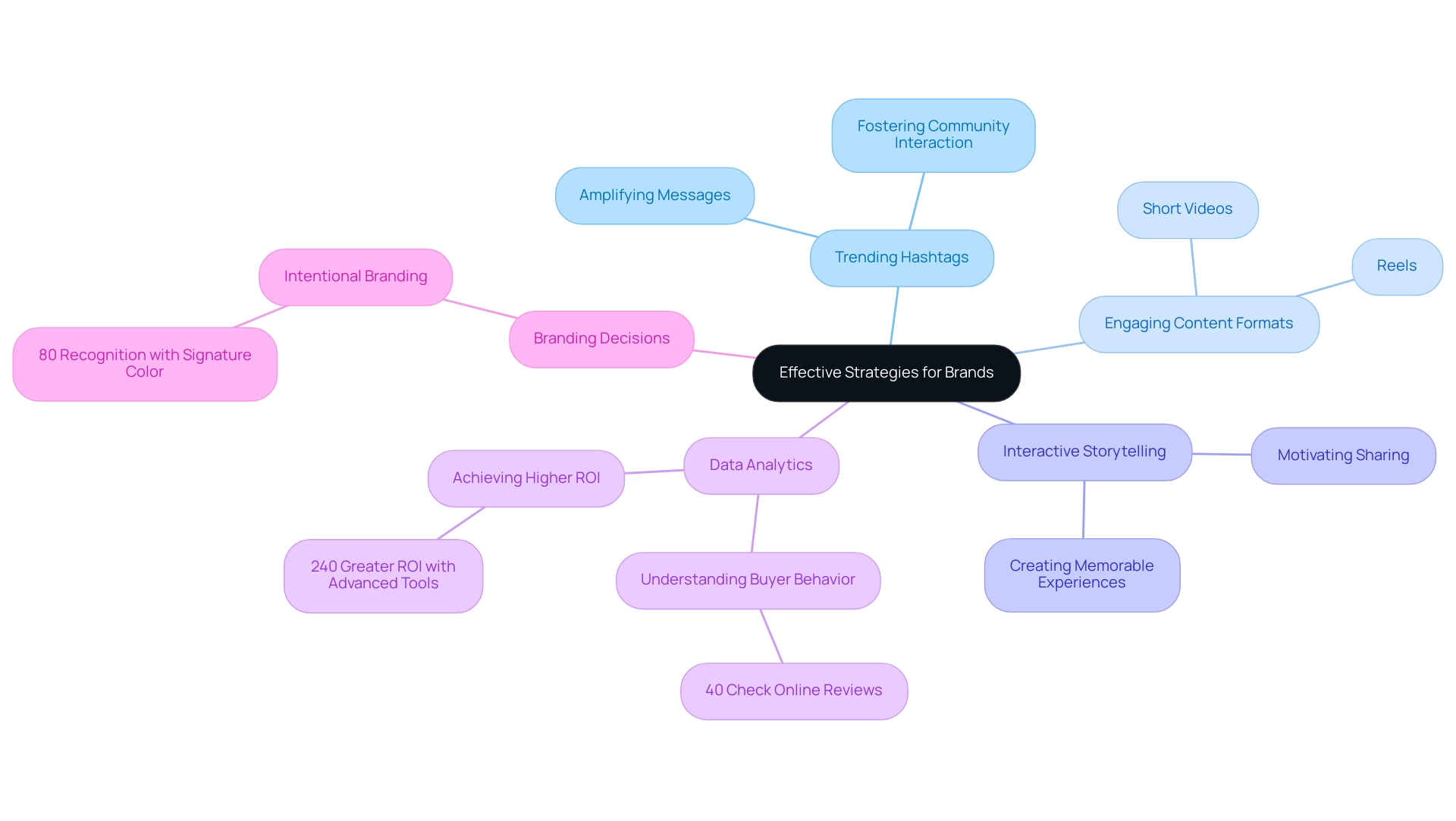
Harnessing User-Generated Content for Authentic Brand Engagement
User-generated content (UGC) has emerged as a pivotal element in engagement strategies for 2025. By inspiring individuals to share their experiences and generate content associated with their products, companies can greatly improve authenticity and establish trust. UGC serves as powerful social proof, fostering a sense of community among buyers and creating a more relatable image that resonates with today’s audience, who increasingly seek genuine connections.
The effectiveness of UGC is underscored by compelling statistics:
- 62% of marketers encourage influencers to share their real experiences, reflecting a broader trend towards authenticity in marketing.
- Significantly, 77% of individuals are willing to submit UGC for rewards, emphasizing the potential for companies to engage their audience effectively.
- In the fashion and apparel sector, for instance, 66% of customers base their purchasing decisions on the number of reviews available, demonstrating the critical role of UGC in influencing buyer behavior.
Furthermore,
- 85% of individuals check reviews when purchasing footwear, and nearly 70% form opinions based on customer reviews, emphasizing the profound impact of UGC on trust and engagement.
Moreover, companies that leverage UGC on their websites experience a remarkable 20% increase in returning visitors and a 90% boost in the total time spent by those visitors. Sharing UGC on platforms like Twitter can lead to a 20% increase in new visitors, further illustrating its effectiveness in driving engagement. As individuals are more likely to trust content produced by their peers instead of conventional advertising, user-generated content not only boosts engagement but also increases conversions, making it a vital strategy for companies looking to succeed in the competitive environment of 2025.
In fact, Toyota observed a 440% rise in Facebook advertising engagement with UGC compared to non-UGC ads, highlighting the tangible advantages of integrating UGC into marketing strategies.
In summary, the significance of UGC in brand identity cannot be overstated. With 77% of consumers willing to submit UGC for rewards, companies that effectively harness this potential can cultivate deeper connections with their audience, ultimately leading to increased loyalty and sales.
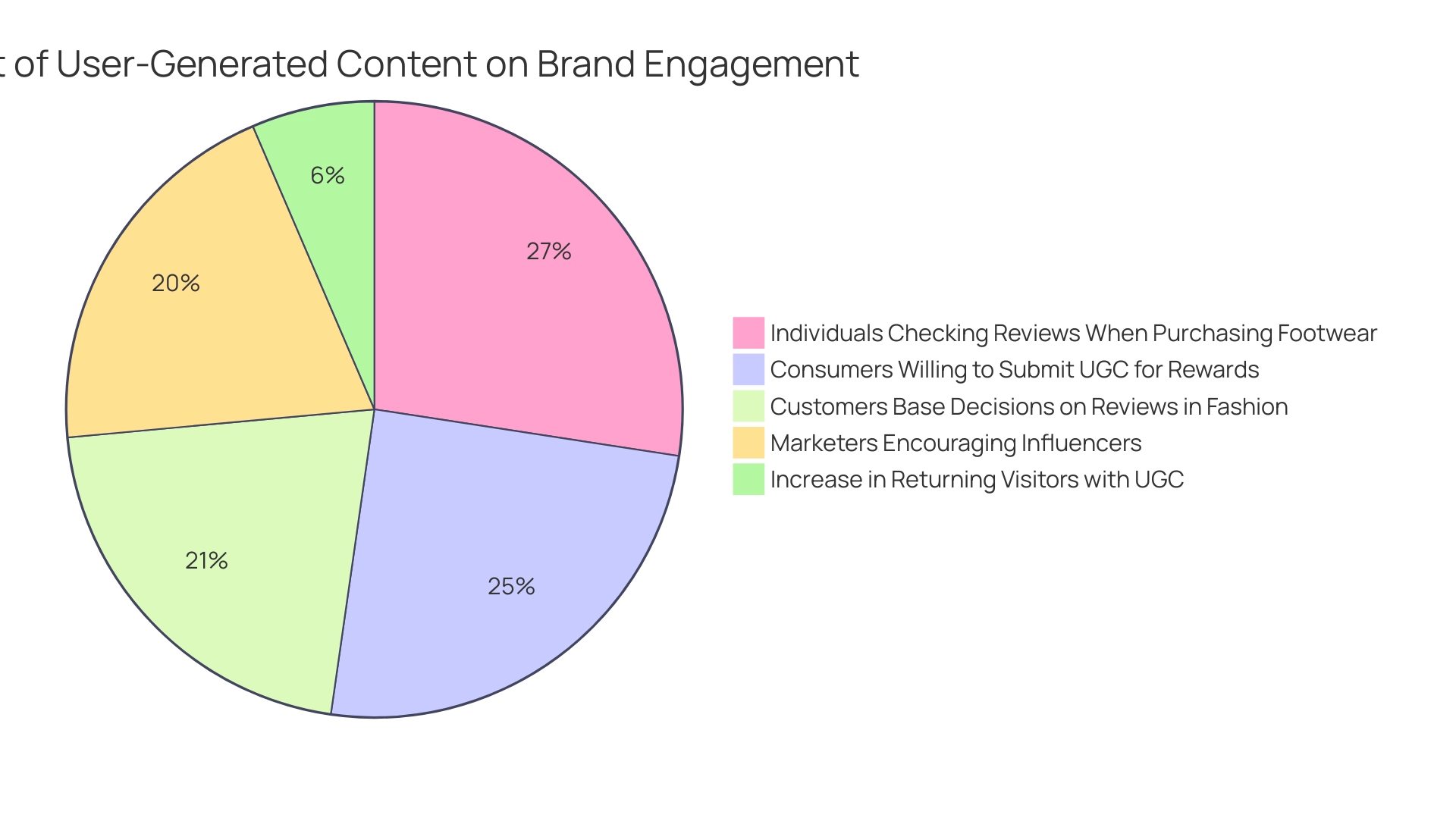
The Shift Towards Personalized and Experiential Branding
In 2025, the branding landscape is undergoing a significant transformation, marked by a shift towards personalized and experiential strategies that underscore the brands trending in this new direction. Consumers are increasingly drawn to brands that offer customized experiences, aligning seamlessly with their unique preferences and lifestyles. This evolution is primarily driven by advancements in data analytics and artificial intelligence, which empower brands to deliver hyper-personalized content and suggestions that resonate with individual users.
Experiential marketing has emerged as a powerful tool for brands, enabling companies to create immersive experiences that connect with individuals on a deeper emotional level. By designing memorable interactions, brands not only enhance customer satisfaction but also foster loyalty in an increasingly competitive marketplace. Statistics reveal that 43% of shoppers abandon their shopping carts in anticipation of personalized discounts, underscoring the critical demand for tailored marketing approaches that meet consumer expectations.
Moreover, a notable trend among high-growth companies is the shift towards leveraging first-party data for personalization strategies, with 61% of these companies acknowledging its significance. This transition highlights an increasing focus on understanding buyer behavior and preferences to craft more effective marketing campaigns that align with market trends.
As Courtney Bozigian, Head of Brand Development, aptly states, “Today, consumers are not just purchasing products or services — they are investing in the story, values, experiences, and the brands that accompany them.” This perspective emphasizes the necessity for brands to develop authentic narratives that resonate with their audiences.
Case studies, such as the customized marketing approach executed for Quaker Oats by WonderEight, exemplify the impact of personalized branding. This initiative not only bolstered brand presence in a competitive market but also yielded improved brand loyalty and customer retention, showcasing the effectiveness of strategic marketing solutions. The approach included focused messaging and tailored promotions that connected with Quaker Oats’ audience, illustrating how personalized techniques can enhance engagement.
Furthermore, WonderEight’s innovative branding solutions, encompassing data-driven insights and creative campaign strategies, have aided numerous clients in navigating the complexities of modern marketing while keeping pace with emerging trends. By leveraging technology and customer insights, WonderEight has successfully enhanced narratives and experiences, positioning itself among the leading brands across various industries.
As companies navigate this evolving landscape, the integration of AI into personalized marketing strategies will continue to play a crucial role. By harnessing technology to improve user experiences, companies can distinguish themselves and cultivate enduring relationships with their audiences. The future of branding hinges on the ability to craft genuine narratives and experiences that connect with individuals, ultimately fostering engagement and loyalty.
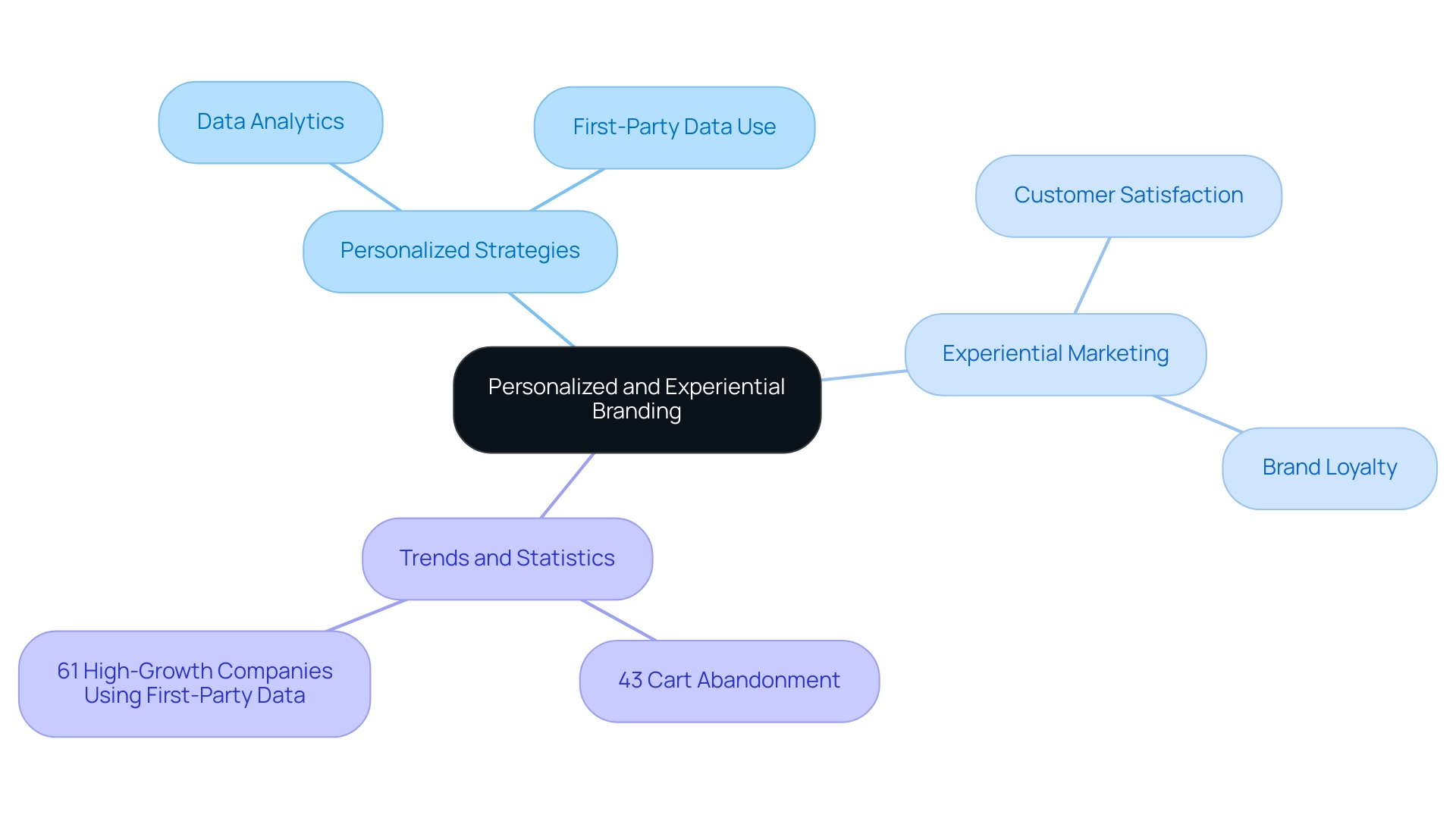
Challenges in Brand Management: Consistency and Adaptation
In 2025, companies face the dual challenge of maintaining consistency while adapting to a rapidly evolving market landscape. The proliferation of digital channels and diverse customer touchpoints necessitates a unified approach that resonates across all platforms. Yet, companies must remain flexible, modifying their messaging and strategies to meet changing customer expectations and emerging market trends.
This balancing act between consistency and adaptability is crucial for fostering trust and credibility—elements vital for remaining relevant in today’s dynamic environment.
Statistics indicate that over 70% of buyers expect personalized communication, with 45% preferring their issues resolved in the first interaction. This underscores the importance for companies to not only present a cohesive identity but also engage clients on a personal level. Additionally, 39% of consumers are willing to switch to companies that demonstrate greater transparency, emphasizing the necessity of a cohesive strategy that aligns with consumer values.
As marketing tech expert Krunal Vaghasiya states, “Value reflects the entity’s worth, its position in the market, and customer loyalty.” This assertion reinforces the significance of brand consistency in cultivating customer loyalty and trust. The costs associated with inadequate marketing can be substantial, leading to diminished sales and a tarnished reputation.
Ineffective branding results in a loss of consumer trust, necessitating costly recovery efforts. For instance, companies that have failed to uphold consistency across their messaging have encountered significant financial losses, illustrating the critical need for effective management, particularly in a landscape where maintaining consistency across digital channels is paramount.
Successful companies in 2025 will implement strategies that ensure their messaging is both consistent and adaptable. WonderEight offers extensive identity and digital marketing solutions designed to assist companies in navigating these challenges effectively. An optimal yearly advertising expenditure of $2 million is recommended for efficiently operating a marketing mix model, highlighting the financial commitment required for successful promotional efforts.
Case studies from WonderEight demonstrate that companies effectively adopting a holistic approach to consistency across digital channels have reported increased customer loyalty and engagement, reinforcing the notion that a well-executed strategy is essential for success in the current marketplace.
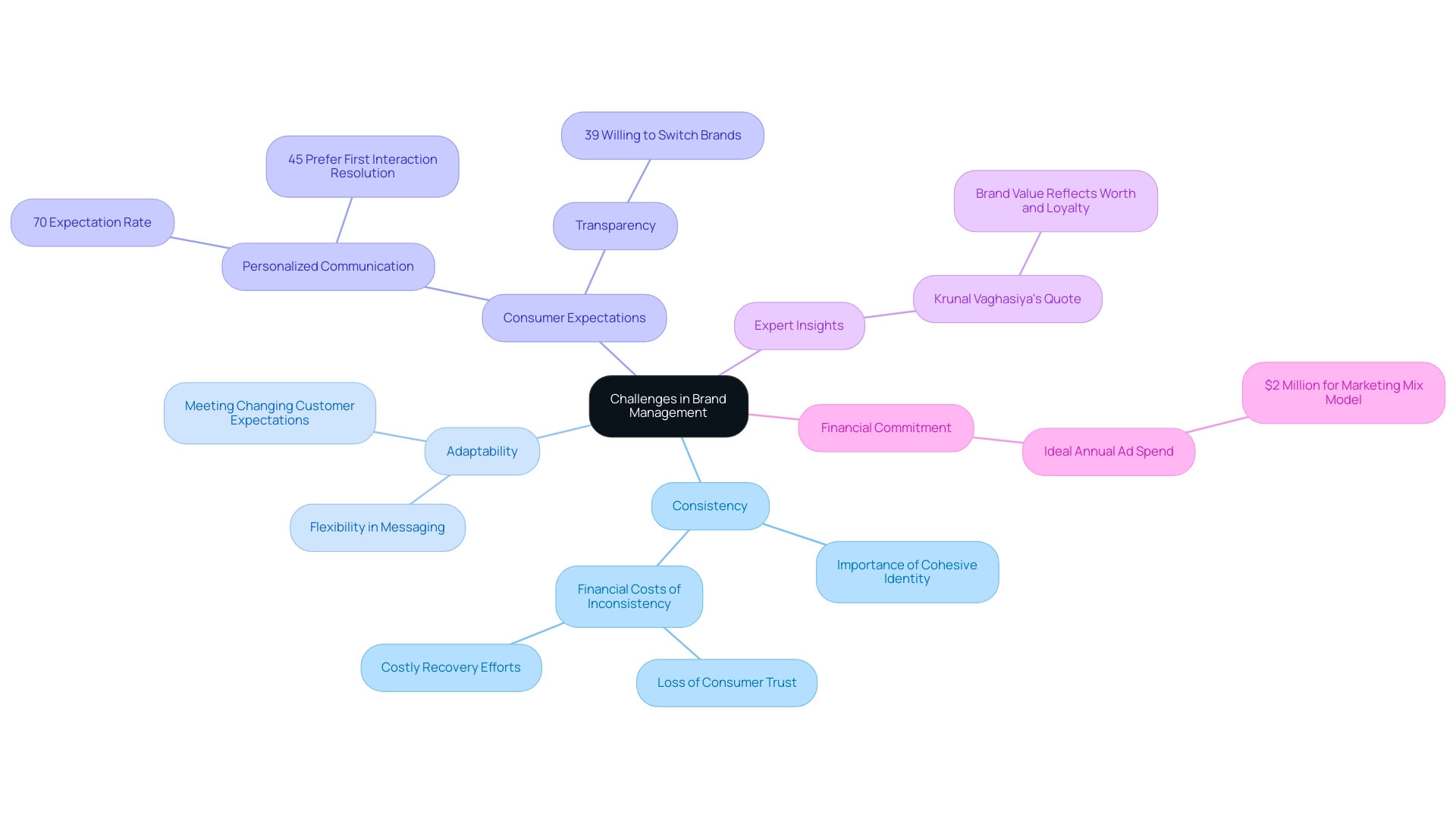
Future Trends in Branding: What to Expect Beyond 2025
As we look beyond 2025, several pivotal trends are set to redefine the brands in the branding landscape. A significant driver will be the continued rise of AI-driven personalization, with 19.2% of marketers already allocating over 40% of their budgets to such campaigns. This shift underscores the necessity for companies to harness data analytics and machine learning to create customized experiences that resonate personally with individuals.
Consider the Restyle App, which offers tailored styling guidance, enabling users to create new clothing combinations with items they already possess instead of continually purchasing new ones. This exemplifies the potential of personalization in enhancing customer engagement.
Sustainability will also play a crucial role in shaping brand narratives. As consumers become increasingly environmentally aware, companies that integrate sustainability into their core messaging are likely to experience heightened loyalty. Research indicates that 57% of customers are willing to spend more on brands they feel connected to, highlighting the importance of an authentic and purpose-driven identity.
Moreover, community-centric strategies are gaining traction as companies strive to foster deeper connections with their audiences. This approach not only enhances customer engagement but also cultivates a sense of belonging among clients. The integration of Augmented Reality (AR) and Virtual Reality (VR) technologies, as demonstrated by companies like IKEA and Sephora, will further transform customer interactions, offering immersive experiences that differentiate businesses in competitive markets.
These technologies are reshaping customer expectations and improving engagement, indicating that early adoption can distinguish companies in competitive landscapes.
Looking ahead, the emphasis on authenticity will intensify, with individuals increasingly drawn to entities that align with their values and beliefs. By anticipating these trends and adapting to the evolving consumer landscape, brands can effectively position themselves for sustained success in an ever-changing marketplace.
Conclusion
The branding landscape of 2025 is marked by a significant shift towards authenticity, personalization, and strategic engagement. With 88% of consumers prioritizing genuine branding efforts, it is imperative for companies to adapt their strategies to foster deeper connections and build trust. Social media, user-generated content, and personalized marketing are pivotal elements that brands can leverage to differentiate themselves in an increasingly competitive environment.
The role of social media is paramount; platforms like Instagram and TikTok are not merely advertising channels but vital spaces for meaningful interactions. Brands that utilize these platforms effectively can significantly enhance their visibility and community engagement, while user-generated content serves as a powerful tool for cultivating authenticity and trust. Moreover, personalization is becoming essential, with consumers expecting tailored experiences that resonate with their individual preferences.
As brands navigate these trends, they must also confront the challenges of maintaining consistency while adapting to evolving consumer expectations. A cohesive brand strategy that aligns with consumer values is critical for fostering loyalty and credibility. Looking ahead, the emphasis on sustainability and community-centric strategies will further shape brand narratives, underscoring the importance of connecting with consumers on a deeper level.
In conclusion, the future of branding hinges on the ability to forge authentic narratives and experiences that resonate with consumers. By embracing these trends and focusing on strategic engagement, brands can cultivate lasting connections and drive success in a rapidly evolving marketplace. The journey towards building a meaningful brand in 2025 demands not only innovation but also a genuine commitment to understanding and fulfilling the needs of consumers.
Frequently Asked Questions
How are companies influencing purchasing decisions in 2025?
Companies are increasingly recognized as pivotal players in shaping purchasing decision-making processes, driven by rising consumer expectations for authenticity and the need to differentiate in a saturated market.
What do consumers prioritize when choosing brands?
Consumers prioritize genuine branding efforts, with 88% of customers now valuing authenticity. They also gravitate towards companies that align with their values and offer personalized experiences.
What impact does excessive advertising on social media have on consumer behavior?
Excessive social media advertisements can lead to consumer disengagement; notably, 43% of individuals unfollow companies that post too many ads, highlighting the need for thoughtful engagement.
Why is strategic identity important for companies?
Strategic identity fosters customer loyalty and engagement. Companies that fail to connect with their audience risk alienation, as 76% of individuals report that interactions falter when perceived as unwanted or intrusive.
How does brand identity affect consumer decision-making?
Effective branding enhances market position, drives customer loyalty, and contributes to revenue growth, reflecting the company’s value and competitive advantage.
What role do influencers play in modern marketing strategies?
Influencers help companies engage with customers and influence purchasing decisions. Leveraging influencers is a key part of a structured marketing approach that can enhance brand visibility.
How is social media shaping brand popularity in 2025?
Social media platforms like Instagram and TikTok enable direct engagement with consumers, facilitating real-time feedback and community involvement, which are essential for crafting compelling brand narratives.
What trends are emerging in social media marketing?
There is a significant increase in TikTok influencer campaigns, with a 26% rise in 2023, indicating the platform’s growing importance in marketing strategies.
How are companies using social media for business growth?
Companies are increasingly using social media for brand awareness, customer engagement, and direct sales, which highlights the critical role these platforms play in contemporary marketing.
What is essential for companies to maintain a competitive edge in marketing?
Businesses must prioritize robust social media strategies and diversify their engagement across various platforms to keep pace with trending brands and enhance consumer loyalty.



